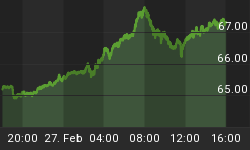Hugo Chavez, dictator of Venezuela and socialist extraordinaire, passed away on Monday in Caracas. The world will little note nor long remember what Chavez did for/to his country, and yet we care about his passing - not because of what he was, but because of what Venezuela could be and could have been.
I visited Venezuela in 1997 or so - pre-Chavez - when I was the main US fixed-income strategist for Bankers Trust. I had dinner with several members of the central bank, who said quite frankly that if they chose, they could easily pay off Venezuela's external debt with their oil revenues. And that, mind you, was with oil prices around $20/bbl. It was also approximately the high point of Venezuelan production, which has fallen from 3mbpd to 2.4mpbd since then. Venezuela provides about 3% of the world's supply of crude, despite the fact that it has among the biggest, if not the biggest, reserves of oil in the world. And yet, according to Capital Economics as cited by the Wall Street Journal, oil prices below $100/bbl could trigger a balance of payments crisis. The dictator milked his nation's natural resources for billions upon billions - some of it went to "the people" in ways that were wasted by the typical inefficiencies of a socialist economy, and much of it to secure his own power.
It's not quite as easy as saying that the next Presidente should develop Venezuela's oil resources. Venezuela isn't just a member of OPEC; it is a founding member of OPEC along with Iran, Iraq, Kuwait, and Saudi Arabia. So it isn't as if the country can just start pumping wildly and change its fortunes through improved revenues. For the good of the country, most of what will need to happen under Presidentes in the future will be structural and expenditure-side. (Where have we heard that before?)
Accordingly, oil prices are likely to remain relatively undisturbed by this development, unless it appears that the next Presidente is a pure capitalist who plans to exit OPEC. Don't hold your breath for that. In fact, to the extent that there is any unrest or confusion in the country because of a power vacuum, it might increase oil prices in the near-term. For now, Chavez's vice president (Nicolas Maduro) will become president and a new president theoretically elected in thirty days. However, the history of Chavez, Maduro, and their party does not make most observers comfortable that this will necessarily happen in the way it is written in the Venezuelan constitution.
Meanwhile, Venezuela's inflation is a hardly-worth-noticing 21.6%. They must have a really positive output gap, right? Of course, such inflation might have something to do with the fact that the money supply is up 600% since the end of 2007...nah, couldn't be. The chart below (source Bloomberg, with my annotations) shows M2, GDP, and CPI for Venezuela, normalized to January 31, 2008 (just after a redenomination of old Bolivars into Bolivar Fuerte at 1000:1, which would have made the chart look screwy).

Notice a couple of things. First, notice that the huge money-printing has done nothing whatsoever to Venezuelan growth. Second, note that the huge money-printing has, however, drastically increased prices in Venezuela. Third, notice that the increase in prices has been similar in magnitude to the increase in money (technically, the increase in money divided by GDP, but as I said GDP didn't move much) - which is just exactly what theory predicts, and what has been seen time and time again in hundreds of countries spanning scores of years.
This isn't an instance of "hyperinflation;" rather there has been consistent inflation in the 20-35% per annum range since 2008. That's high, but not so high that it's completely divorced from our experience of the reaction of prices to monetary policy. It is, or should be, a precautionary lesson. As bad as Chavez's mismanagement of the Venezuelan economy was, which helped produce the stinky growth, it was the mismanagement of the money supply that caused the inflation.
It is interesting, too, that since inflation tends to increase wealth inequality if the wealthy can own assets other than money, the inflation itself tended to keep the poor - the main constituency of a populist - in a position of greater need and greater reliance on the State. Increasing inequality and plausible deniability as to whether it is the leader's policies that are creating that inequality: that's a delicious cocktail if the leader has a desire to hold and increase his power.
So we take notice of Chavez's passing, for its potential impact on oil markets but even more for the opportunity it gives us to reflect on the lessons we could have, and should have, learned from the operation of his regime.















